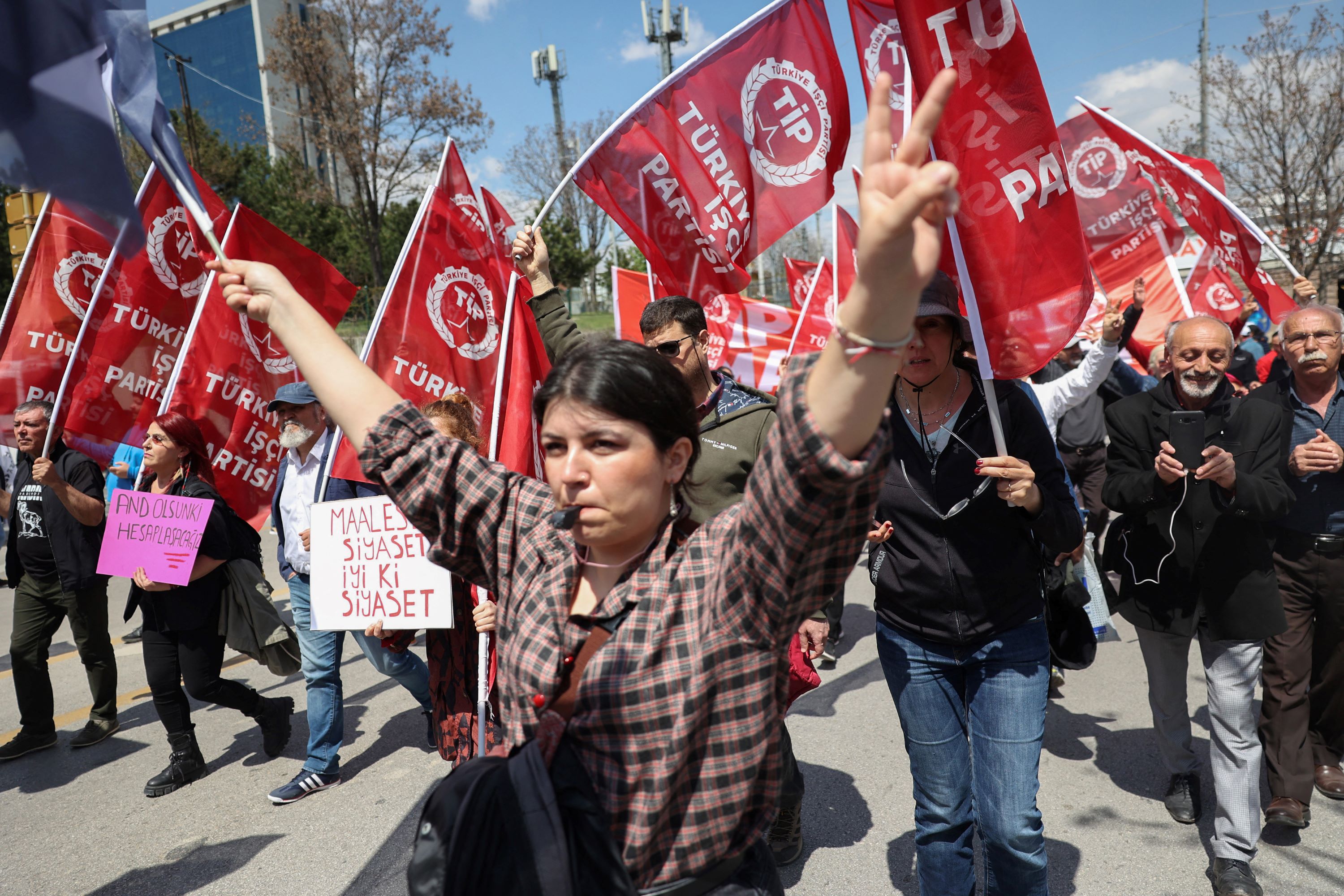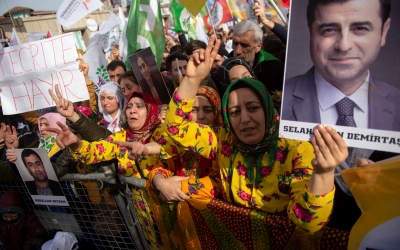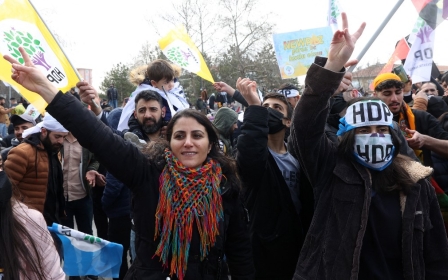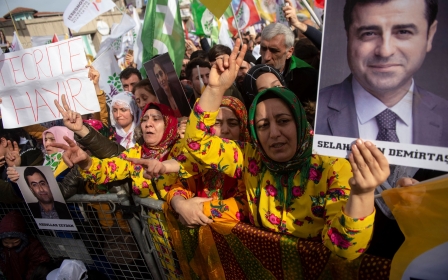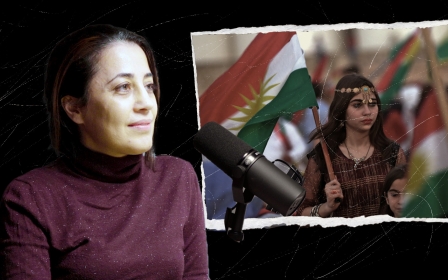Turkey: What's next for the Kurds and the left after elections?
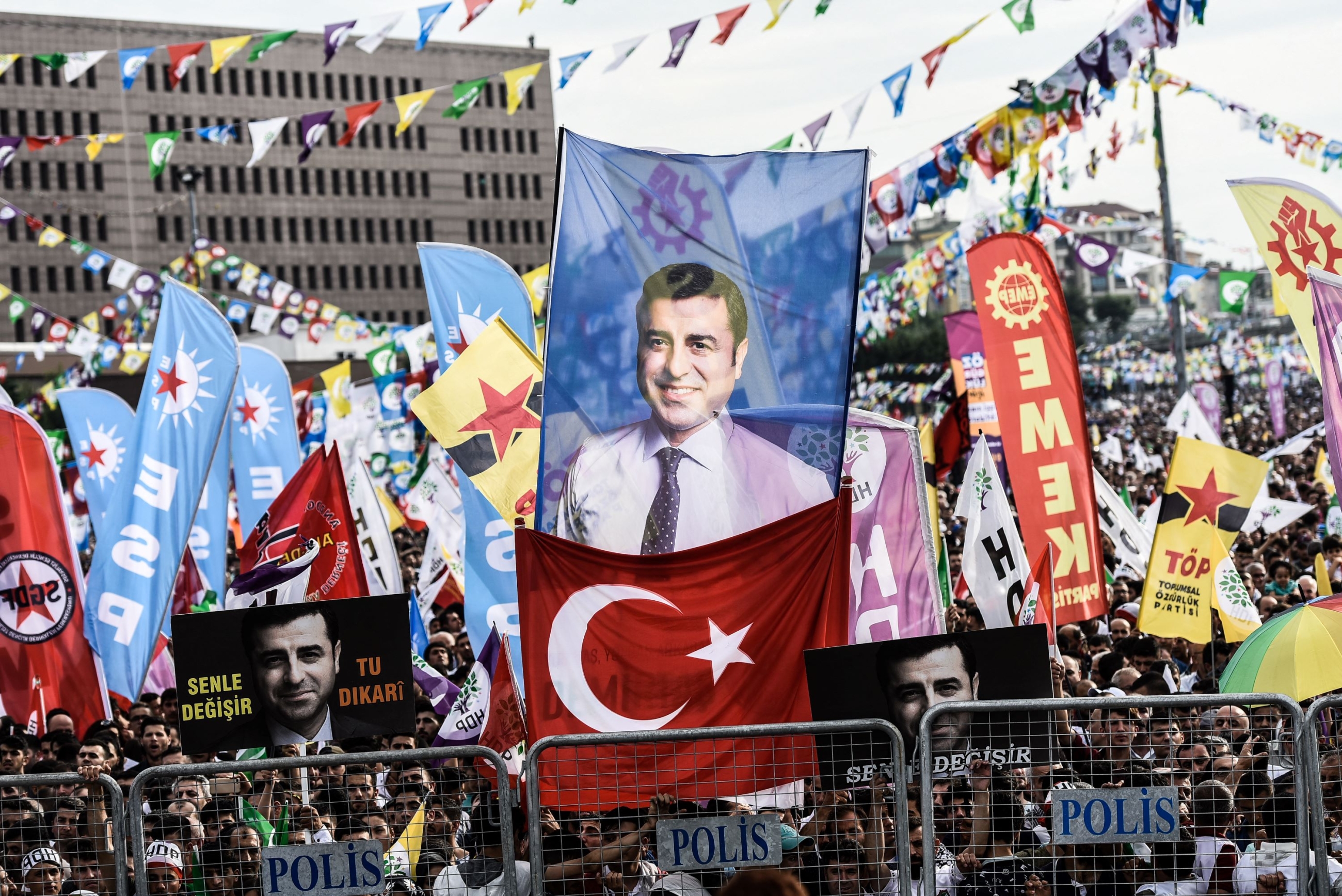
As the dust began to settle on Turkey's presidential elections and opposition hopes of unseating President Recep Tayyip Erdogan were dashed, the newly re-elected incumbent took to the balcony of the presidential complex in Ankara to address his supporters.
In his victory speech, he lambasted his rival Kemal Kilicdaroglu and claimed that had the opposition candidate been elected he would have released Selahattin Demirtas, the jailed former co-leader of the left-wing, pro-Kurdish Peoples' Democracy Party (HDP).
"In Turkey, where rights and law rule, you cannot release Selo, who caused the death of 51 of our Kurdish brothers, as you wish," he said, using a nickname for Demirtas, and referencing protests in the Kurdish-majority southeast in 2014, which saw dozens killed in street violence.
"It is not possible for such a thing to happen in our government. In our power, justice is the basis of property!"
In response, a number of his supporters chanted: "Death penalty for Selo!"
New MEE newsletter: Jerusalem Dispatch
Sign up to get the latest insights and analysis on Israel-Palestine, alongside Turkey Unpacked and other MEE newsletters
Kilicdaroglu has said that European Court of Human Rights rulings on Turkey should be implemented, including those that call for the release of Demirtas, who has been imprisoned - along with co-leader Figen Yuksekdag - since 2016 on terrorism charges.
Kilicdaroglu also accepted the support of Demirtas' party, which encouraged a vote for him in the presidential elections, believing him to be more likely than Erdogan to end a crackdown that has seen scores of local and national HDP politicians jailed and sacked in the last decade.
'Erdogan will attack all the democratic opposition starting with Kurds, women, and LGBTQ'
- Cigdem Kilicgun Ucar, YSP
The HDP ran in the elections under the banner of the Green Left Party (YSP) - after being threatened with closure by the constitutional court - as part of a parliamentary alliance with the left-wing Turkish Workers Party (TIP). In the end, the alliance scored 65 seats in the parliament, a result broadly in line with the previous election.
However, following the result and the failure of the YSP to make any real advances, Demirtas put out a statement from prison announcing he planned to "leave active politics at this stage".
The decision to provide tacit support to Kilicdaroglu has proven controversial among both supporters of the opposition Nation Alliance, particularly its more nationalist elements, and the HDP's core voters, who are wary of some figures within the opposition alliance.
Nevertheless, argues YSP co-spokesperson Cigdem Kilicgun Ucar, the strategy of backing the opposition candidate was the lesser of two evils.
"Our strategic aim in the elections was to overthrow Erdogan’s regime democratically. It was not fixed [that we would] support Kilicdaroglu, but the reality was like that," she told MEE.
"We believe that our strategy was correct."
Once seen as one of Turkey's most charismatic and successful leftist leaders in decades, Demirtas has now bowed out of politics and the new parliament has a bigger majority of religious conservatives and ultra-nationalists than ever, both in the opposition and government camps.
For many women's rights, LGBTQ, leftist and Kurdish activists, that portends a worrying future.
"Erdogan will attack all the democratic opposition starting with Kurds, women, and LGBTQ," claimed Ucar.
"These were his main arguments during the elections and since we have the local elections in ten months, he will continue to do so."
Tense alliances
The HDP was formed as a coalition of numerous left-wing parties (including the YSP itself) and social movements, seeking the bridge the gap between the Kurdish movement and progressive Turks.
As such, aside from the Kurdish electorate - which makes up its biggest support base - the HDP has been able to rely on the support of other minority groups in the country, the more radical wing of the labour movement, and Turks who are unimpressed by the credentials of Kilicdaroglu's nominally centre-left People's Republican Party (CHP).
'The inability of the opposition camp to sit down and acknowledge [the HDP] as part of the opposition bloc upset a lot of Kurds in Turkey'
- Giran Ozcan, Kurdish Peace Institute
Though the CHP does have a smattering of avowedly left-wing members and politicians, its Turkish nationalist leanings and past support for stripping HDP MPs of their parliamentary immunity have made it an unlikely ally.
In addition, its coalition with five other right-wing parties - which actively prevented the HDP from joining - left many Kurdish and leftist voters unimpressed.
"The inability and unwillingness of the opposition camp to sit down and acknowledge them as part of the opposition bloc upset a lot of Kurds in Turkey," said Giran Ozcan, executive director of the Kurdish Peace Institute.
Ozcan, until 2021 the HDP's representative in the US, told MEE that his former party had made a mistake in not fielding a candidate in the first round of the presidential elections - and that Kilicdaroglu's ultra-nationalist shift ended up demoralising the HDP's base.
Following the first round of voting, in which Kilicdaroglu received 44.96 percent of the votes against Erdogan's 49.4 percent, the former pitched his campaign to the right and promised to expel all refugees from Turkey.
Though his strategy was an apparent attempt to court the 5.17 percent of voters who backed nationalist third candidate Sinan Ogan, it seemingly led to a drop off in voting in the Kurdish region in the second round.
In the end, Erdogan was returned to power.
"We were expecting and intending to have a better result," admitted Ucar.
"We have to analyse and discuss with our people about this."
The way forward
Since Erdogan's victory, many observers, both domestically and internationally, have been waiting to see which direction the president will steer a country wracked by a financial crisis and social unrest.
Earlier this week, Erdogan revealed his new cabinet. Perhaps the most notable figure to rejoin his team has been Mehmet Simsek, a former Merill Lynch economist who had been part of the Turkish leader's top team between 2007 and 2018.
Simsek's appearance has given renewed hope to investors that the country will return to an "orthodox" economic path, away from Erdogan's big spending and commitment to low-interest rates - and one more akin to his Justice and Development Party's first decade in office, when Erdogan was hailed for his free market-oriented reforms.
That may lead, mainstream economists hope, to an improvement in Turkey's long-term economic prospects.
But, with living standards already squeezed, and restrictions on trade union activity, workers' rights groups are concerned.
"Union membership has become a reason for dismissal. The police prevented union activities, unionists were detained, May Day was prohibited and strikes were banned," said Kivanc Eliacik, director of the international relations department of the Confederation of Progressive Trade Unions of Turkey (DISK), a left-wing union.
Eliacik told MEE that Turkey had become "a country of minimum wage earners and country of working poor" and said Erdogan helped accelerate a trend that had left 95.3 percent of private sector workers deprived of union rights.
'Instead of anger and prejudice, we need mutual understanding. We need a broad-based coalition that brings together different social segments'
- Kivanc Eliacik, trade unionist
On top of his economic policies, Erdogan has portrayed himself as a defender of traditional family values.
He has referred to homosexuality as a "perversion" targeting family life, labelled his opponents as "pro-LGBT", and on Tuesday said that he would be introducing a constitutional amendment to "protect the family from perversion".
With the range of challenges facing them, part of the challenge for the left going forward is bringing together a political coalition that respects different movements under threat from the government - not least for the HDP, whose support base is in the socially conservative southeast of Turkey.
"Instead of anger and prejudice, we need mutual understanding. We need a broad-based coalition that brings together different social segments," Eliacik said.
"We need a government that will transform the economy in favour of the workers, in terms of tax policies, wages, and social rights."
'A new chapter'
Not everyone is sure that the Kurdish movement's current alliance with the Turkish left has been fruitful.
Vahap Coskun, a law professor at Dicle University in the Kurdish-majority city of Diyarbakir, argued that the HDP had effectively been carrying the Turkish left on its shoulders, boosting its stature beyond where it would normally be.
"If the Turkish left enters the elections under its own name, it can neither exceed the election threshold nor elect a deputy - however, the HDP brings the Turkish left to the parliament in every election," he told MEE.
Coskun suggested that in the wake of the 2023 vote, the HDP would have to "reconsider" its strategy for future elections and instead focus on "unity of struggle on certain issues instead of cooperating in elections".
Ozcan, however, suggested talk about a split between the Kurdish movement and the Turkish left was a "false dichotomy".
"The Kurdish movement that is represented by the HDP in Turkey is a leftist movement itself, it’s the biggest leftist movement in Turkey... by definition, it will always seek to partner with like-minded organisations," he said.
Since the founding of the Republic of Turkey in 1923, pro-Kurdish and leftist parties have become used to a seemingly never-ending cycle of establishment and closure.
The HDP was preceded by the Peace and Democracy Party, which itself was preceded by the Democratic Society Party. The latter followed on from the People's Democracy Party, and the Democracy Party.
All of the HDP's leftist predecessors were forcibly closed, in 2014, 2009, 2003, and 1994 respectively.
The party's supporters may fear for the future, but Eliacik cited a popular phrase by the Italian Marxist thinker Antonio Gramsci: "Pessimism of the intellect, optimism of the will."
"The day after the election, we went to the morning shift [at work], and we continued to have trouble paying our bills and worrying about our future," he explained.
"Elections are not the end - it's the beginning of a new chapter."
This article is available in French on Middle East Eye French edition.
Middle East Eye delivers independent and unrivalled coverage and analysis of the Middle East, North Africa and beyond. To learn more about republishing this content and the associated fees, please fill out this form. More about MEE can be found here.


